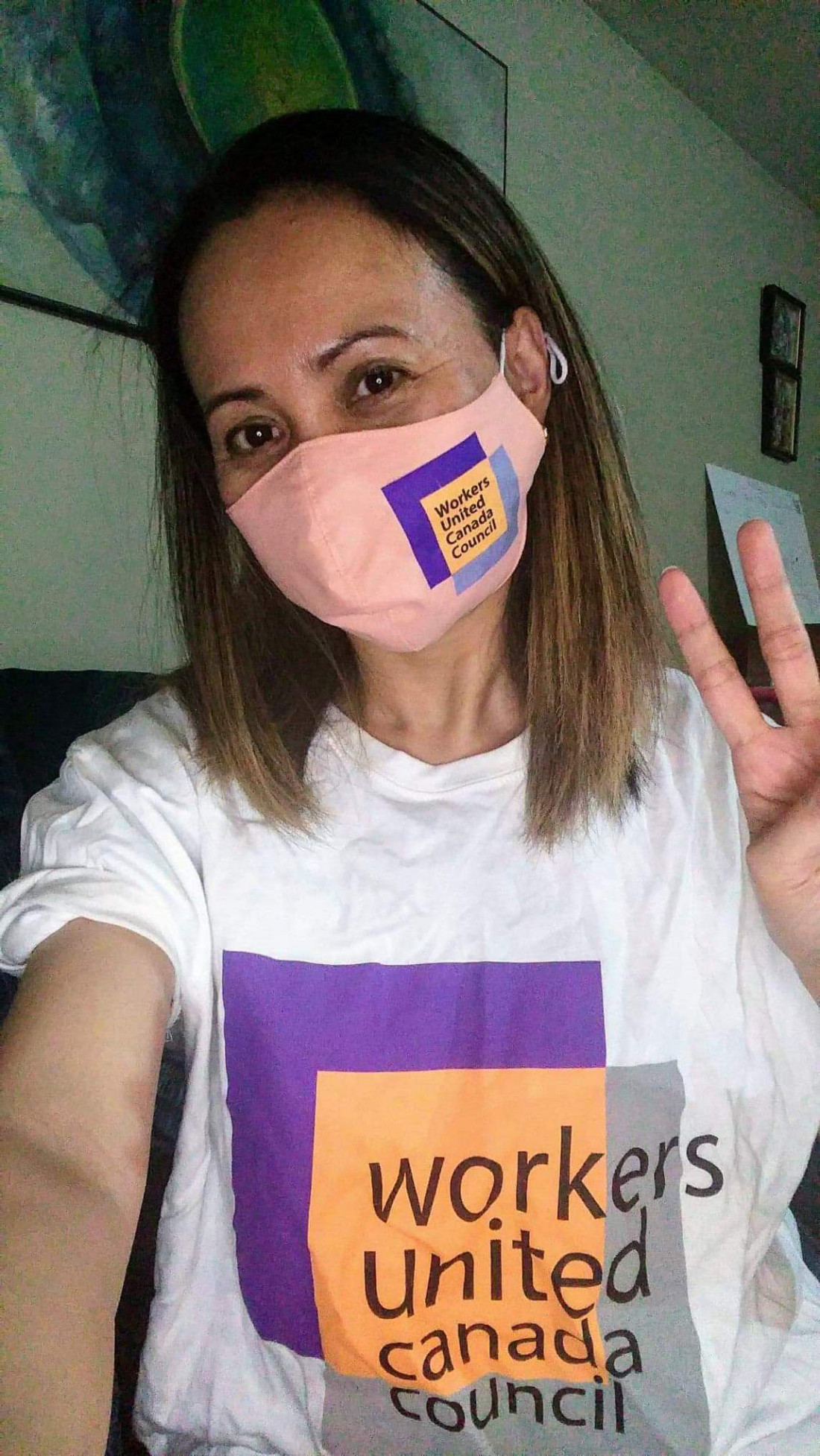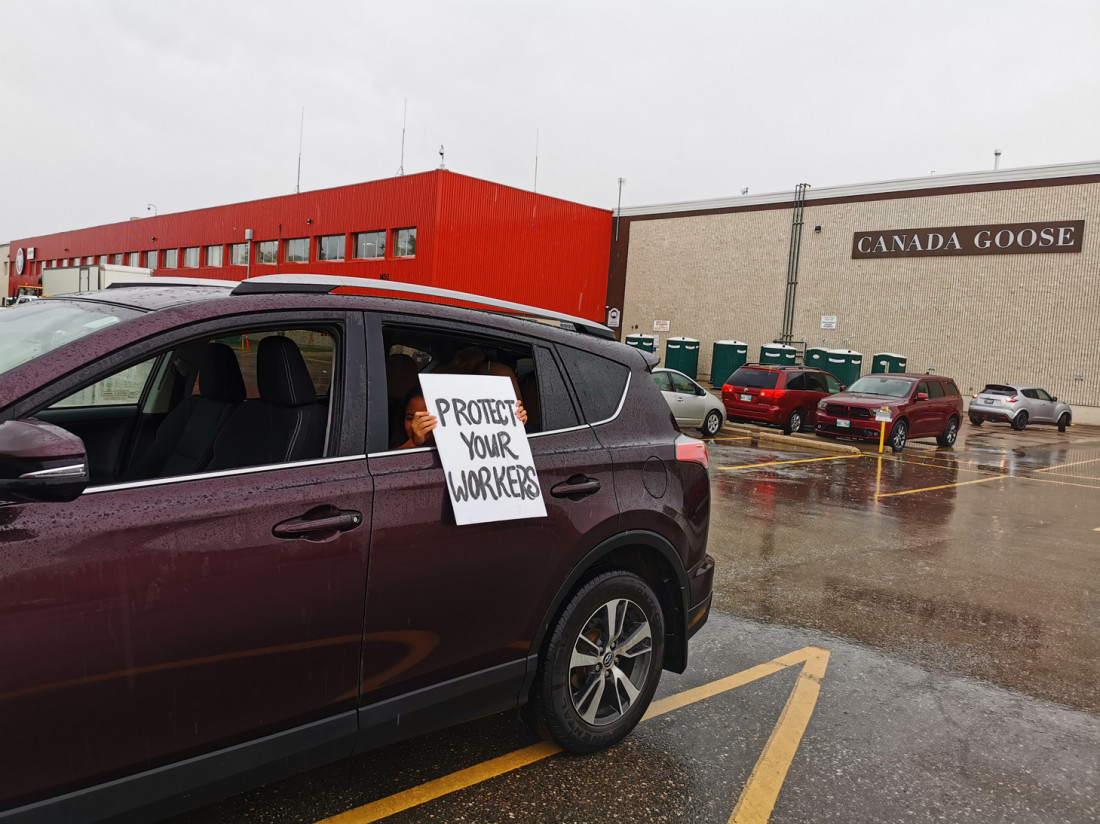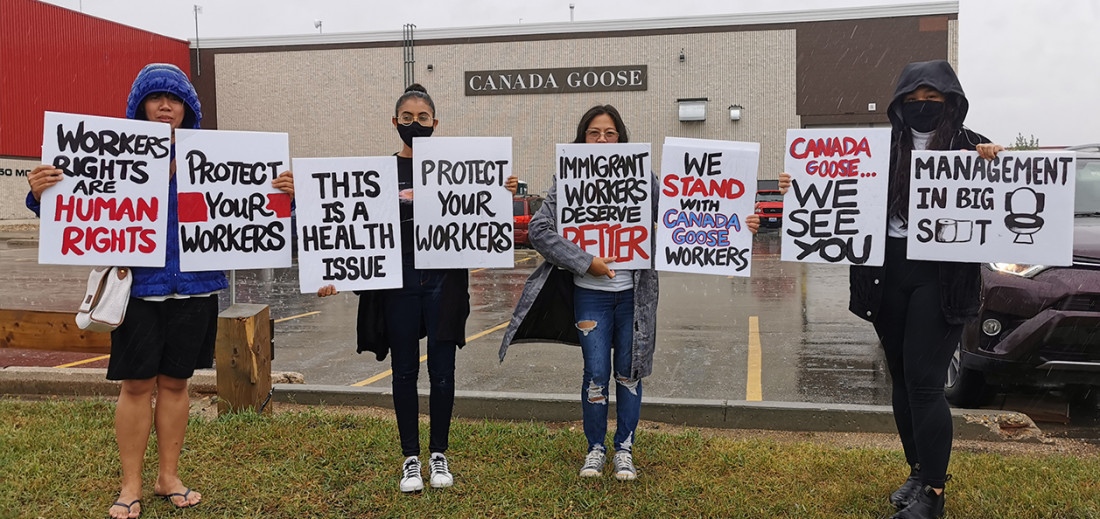Canaries in the garment factory
Canada Goose workers contend with labour organizing challenges, fear of termination

Alelie Sanvictores is one of the workers spearheading the push to unionize Canada Goose’s Winnipeg factories.
Alelie Sanvictores has spent the last five years working as a seamstress at a Canada Goose warehouse in Winnipeg. In 2019, she became an outspoken union leader, knocking on doors and making phone calls to her fellow workers.
Sanvictores says management invited her to sit on the ERC (employee resource committee) prior to learning of her status as a union supporter, “so they could learn more about workers’ concerns and try to undermine the union.”
“When I became more outspoken, and it was clear that I was supporting the union effort, they made a new rule limiting time on the ERC and asked me to leave the committee,” she says.
After COVID-19 incited workplace closures in March 2020, Sanvictores spent nearly a year laid off from her job at Canada Goose. Sanvictores says workers were called back based on seniority before it was revealed that workers at the three Canada Goose factories in Winnipeg were organizing a union drive.
Though 70 per cent of Canada Goose staff have been called back to work in the factories, Sanvictores believes her status as a union leader prevented her from being recalled earlier, despite her seniority. She says less senior workers and new hires were called instead.
“Why didn’t they call us, the people waiting for a job?” she asks. “That’s why I’m very upset, not only for me, but (for) some of my friends (who are) still waiting.”
After an Unfair Labour Practice charge was filed against Canada Goose on behalf of Sanvictores alongside a social media campaign to #RecallAlelie, Sanvictores was called back to work on Feb. 24. However, she says many of her former coworkers still wait for a call.
Origins and tensions
Founded in 1957 by Samuel Tick, a Polish-Jewish immigrant, Canada Goose formerly functioned as a 100 per cent unionized company. In December 2013, the private-equity firm Bain Capital bought a majority stake of the winter-jacket manufacturer, leading to the de-unionization of some locations where the firm was not obliged to recognize one. While locations in Toronto are unionized with Workers United Canada Council (WUCC), the three Winnipeg factories are not.
“We have an agreement in our contract that doesn’t give Bain the option of not recognizing the union,” Richard Bensinger, an organizer with the Canada Goose union drive and the founder of the Organizing Institute of the American Federation of Labour and Congress of Industrial Organizations (AFL-CIO), says. “Where they don’t have to do it, like in Winnipeg, they don’t. They could’ve recognized the union here.”
Now, a slew of workers across the three Canada Goose garment factories in Winnipeg are fighting to organize in the workplace. Sanvictores remains one of the few outspoken workers among 1,200 others who voted in favour of unionizing across the three Winnipeg plants. She says that while many workers support the drive, there remains a deep-seated climate of fear.
“Right now, the company has created a fear of organizing a union,” Rabia Syed, an organizing director at WUCC, says. When the union drive was in action, Syed says workers were reluctant to sign cards in fear of being terminated from their jobs.
Sanvictores alleges that discrimination, unreasonable piece-rate expectations, a lack of paid-leave options, as well as health and safety concerns have been physically and emotionally taxing on many factory workers.
In August 2020, the Winnipeg Free Press released an article detailing the experiences of Canada Goose employees at their 1455 Mountain Ave. location who were forced to use portable toilets that were allegedly only cleaned every four days. As a result, many workers used their 30-minute breaks to use public washrooms or “work with their own commodes” in their vehicles.
In a statement provided to PressProgress, which reported on the same issue in August 2020, Canada Goose stated that the bathroom facility repairs had been resolved.
When workers at the three Winnipeg factories attempted to unionize, Bensinger alleges that management held meetings where employees were intimidated into not supporting the union. He says one worker he spoke with was called into an office where management attempted to persuade them into signing an objection to the union vote. They refused.
While Bensinger says the worker was never fired, this person has since faced increased hostility from management.
When it was found that a manager made anti-union statements days before the union vote, the Manitoba Labour Board fined Canada Goose $2,000.
“Only after we made an issue of it, only after we produced a tape recording and filed charges, then they fired the person who did the meeting and said it was a ‘rogue manager,’” Bensinger says.
“I’ve never seen a group of workers more fearful, period,” Bensinger, who has four decades of labour-organizing experience, says.

Jeff Traeger, president of United Food and Commercial Workers Canada Local 832
Organizing in a pandemic
In the time of COVID-19, workplace health and safety has been brought to the forefront like never before, according to Jeff Traeger, the president of the United Food and Commercial Workers Canada Local 832 (UFCW 832).
“What COVID has done is brought a new angle,” Traeger says. “There’s a lot of people that we’ve been in contact with in our organizing drives that have significant concerns about their employer’s response to COVID.”
COVID-19 has also dramatically changed the landscape of labour organizing. Traditionally, Traeger says UFCW 832 would knock on doors and host in-person meetings after being contacted by an employee about organizing a union drive. Now, they’ve moved everything completely online.
Winnipeg Youth United (WiYU) is a group of youth leaders engaging in community education and workers’ rights issues. As an act of solidarity with Canada Goose workers seeking to unionize, WiYU and the WUCC went online to garner public awareness and support by creating a multi-platform social-media campaign.
Jo Ann Pinera, one of the youth organizers with WiYU, believes the campaign resonates with youth in a different way.
“Utilizing the power of social media is really strategic for this campaign,” Pinera says. “As youth, we’re always connected to our devices. It’s an important move to use social media and to use our influence on the online world, especially in a pandemic, to shine a light on this cause.”
A few workers, including Sanvictores, have publicly voiced their concerns about the conditions and alleged anti-union activity at Canada Goose. For the majority of workers who fear the consequences of speaking out, Pinera says the platform acts as a way to uplift their voices while still protecting their identities.
The campaign has caught the attention of several labour organizations across Canada and the United States, as well as politicians like Winnipeg Centre MP Leah Gazan.
Despite some of the hardships the campaign has faced (including having their Instagram taken down after a complaint on behalf of Canada Goose reported them for “trademark infringement”), Pinera says the importance of building solidarity among workers, youth and the greater public is crucial to maintaining traction.

The campaign to unionize Winnipeg’s Canada Goose factories has been stymied by the company’s efforts, including having a pro-union Instagram account taken down for “copyright infringement.”

Sanvictores alleges that, when workers were recalled to factories after COVID-19 restrictions loosened, her return was delayed due to her pro-union views.
When two struggles collide
In a company where the vast majority of their sewing staff is immigrant women, Jas Randhawa, an organizer with WUCC, says the challenges of labour organizing for immigrant Canada Goose manufacturers is coupled with the precarity of being new to the Canadian workforce.
“As an immigrant worker, coming from India myself, I know what it’s like to have that fear of losing your job,” Randhawa says.
She adds that many are often forced to reconcile with the fears that speaking in support of a union will put them at risk of termination. For immigrant workers with families to support, the stakes are often too high to feel comfortable voicing their concerns.
Syed agrees with Randhawa’s sentiment, adding that a language barrier can mean the job pool newcomer workers can tap into is marginal.
Pinera believes acknowledging the union would be a testament to the progressive, pro-immigrant values Bain Capital and Canada Goose claim to have.
On their website, Bain Capital pledged to invest $100 million over five years to promote racial equity and social justice, alongside several diversity, equity and inclusion commitments. Similarly, Canada Goose has prided itself on providing skilled production training for their immigrant workers.
“Part of our aim as youth on this campaign is to also shine a light on the company and urge them to do better,” Pinera says. “They’re saying all the right things. They just need to put it into practice.
“It’s a fight, but it’s something that needs to be done. As hard as it is, it’s important that we continue to uplift and empower the workers in the factory.”
“We need a union. We need a voice. We need somebody to fight for our rights,” Sanvictores says.
Bain Capital deferred a request for comment from The Uniter to Canada Goose. Canada Goose provided these statements:
“We are proud at Canada Goose to have been able to welcome back thousands of employees across our Canadian manufacturing facilities. Across our operations, we have recalled workers based on a number of considerations, including: job classification, seniority and efficiency.”
“Our sick-leave policies address all provincial and federal requirements, meeting or exceeding industry standards across all facilities.”
Update: Canada Goose provided the following statement to The Uniter on March 5, 2021:
"As a Canadian business, we are proud of the manufacturing infrastructure and the diverse and skilled workforce that we have hired and trained across Canada - representing more than 20% of the Canadian Cut & Sew Industry. We are committed to ensuring that our employees are treated with dignity, free from harassment and discrimination based on race, ancestry, colour, nationality or ethnic origin, citizenship, religion, age, sex, sexual orientation, record of offences, marital status, family status or disability. Canada Goose and its management team recognize and respect the right of all workers in Canada to organize in accordance local law. Since 2017, and prior to the onset of the COVID-19 pandemic, the number of unionized employees at Canada Goose has increased by more than 175%. The health and safety of our employees is a top priority for Canada Goose. As a result, Canada Goose has put in place rigorous protocols to mitigate COVID-19 transmission across our facilities in Ontario, Quebec and Manitoba. Our facilities, processes and supporting documents have been inspected and reviewed by Manitoba Workplace Safety & Health, Ontario Public Health, CNESST & Quebec Public Health. All have acknowledged that our COVID protections program meets or exceeds what is expected of employers."
Published in Volume 75, Number 20 of The Uniter (March 4, 2021)








